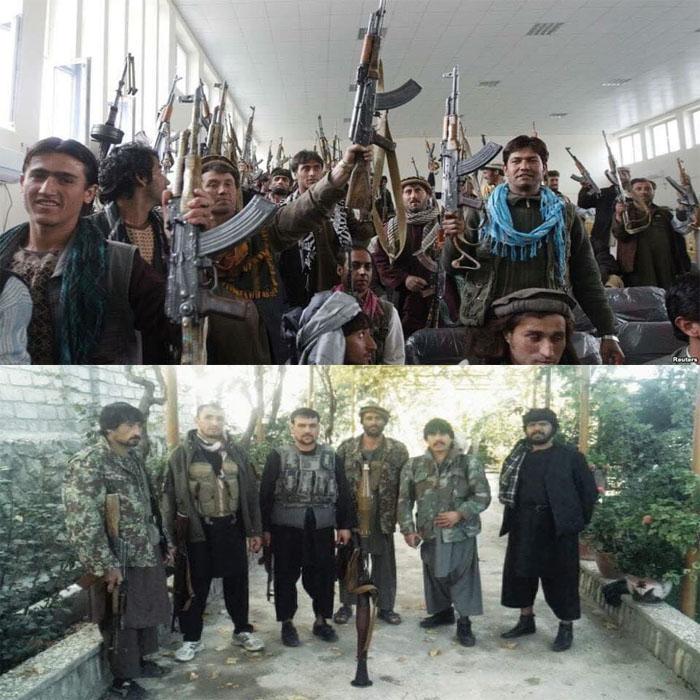KABUL (Pajhwok): Some military analysts claim the proposed Security Charter is a threat and arms distribution is part of the program, which may lead to public intimidation.
However, government sources stoutly defend the idea and hail it as a public mobilisation programme. They vehemently reject the impression that arms will be distributed to the people under the plan.
Gen. Abdul Wahid Taqat remarked: “I’m aware of it, but I don’t call it a security charter. What kind of charter and for whose security? It is terrorism and intimidation of people.”
“This is the brainchild of Vice-President Amrullah Saleh. The Ministry of Interior’s denial of weapons distribution is a plain lie,” the former general claimed.
He accused some security sector bosses of not being committed to the country and wanted to vitiate the security environment. Mafia groups were behind the charter, he alleged.
The charter would not help improve security, he insisted, rejecting the move as a conspiracy to stoke ethnic strife. It is deliberate effort to arm one ethnic community against others, according to Gen. Taqat.
Hilaluddin Hilal, another defence analyst, thought the so-called security mechanism was far from clear. He slammed the distribution of weapons to people and formation of militias as a failed experiment in Afghanistan.
“The unity of people is essential for maintaining public order. People committed to the country have to be hired and serious attention paid their recruitment. If doesn’t happen, the process would certainly fail and will lead to another round of civil war –something we all have experienced in the past.”
He opined a security charter was effective only when the government controlled and led it. But when the government itself is weak, the formation of such groups does not contribute to boosting security, according to him.
The MoI announced the launch of the security charter programme on July 14 this year. Presidential Spokesman Sidiq Sidiqi had told the launching ceremony the charter was aimed at strengthening security and effectively combating crime.
He said the programme would be developed and implemented in Kabul before it was enforced in other provinces.
Abdul Saboor Qane, deputy minister of interior, had said at the ceremony the security charter had 41 articles, which specified responsibilities of the National Police, Afghan National Army (ANA), National Directorate of Security (NDS) and eight civilian institutions.
Pajhwok sought from MoI details of the 41 articles for explaining them to the public, but the ministry spokesman Tariq Arian said the articles were confidential and could not be shared with the media.
It’s worth mentioning that Abdul Wasil Ibrahimi has recently been appointed as the security charter program Advisor by Amrullah Saleh and he held meeting with veteran former jihadi leader Abdul Rab Rassoul Sayyaf and his nephew Mumtaz Sayyaf in Paghman district of Kabul at the beginning of this week.
(3).jpg)
Concerns at arms distribution
The MoI and the first vice-president’s office said the charter was an agreement between the people and security forces, but it did not have a budget or a specific structure for arming the people.
But Kabul Governor Mohammad Yaqoob Haidari told Pajhwok the weapons and other military equipment for the programme were being provided by the MoI and funded by the NDS.
He hoped the programme would ensure unity and help create an environment where people would work with the security forces to maintain order in their areas.
Once the security part of the programme was completed, he said, people would get jobs, financial support and education and then it would transform into a local army.
The governor revealed preliminary work on enforcing the security charter had started in some districts of Kabul and a list of people who would work with the government to ensure security under the porgramme was being prepared.
Some people had concerns about the programme, Haidari acknowledged. The initiative would allow people being hired by local councils to ensure security.
Before the weapons were distributed in Kabul’s Shakardara district, people had helped the security forces carry out operations and identify suspects, he concluded.
Security forces carried out operations in Shakardara district almost two weeks back. Anwar Khan Oryakhel, a member of Wolesi Jirga from Kabul and a resident of Qarabagh district, said: “Currently, weapons have been distributed in the most insecure districts, particularly in Koh Daman (north of Kabul). The authorities concerned meet such armed men occasionally.”
He said a number of individuals were happy with the programme, which aimed to help them live in a peaceful environment. “I don’t know whether or not anyone has received arms yet, but people have been asked how many weapons are needed and who is ready for joining this program.”
Former intelligence chief Rahmatullah Nabil wrote on his Facebook page: “Some circles in the government have been busy with the creation of militias in different parts of the country, but I would like to say the formation of such militias would not put an end to the ongoing conflict. Instead it would take us back to mistakes of the 70s.”
The Dr. Najibullah government was overthrown in the 1970s and there have since been civil wars between different groups of mujahidin and militias formed during the Najibullah government have also been involved.
Nabil opposed the formation of militias, saying there were other ways to strengthen the government and the security forces.
Afghanistan had militias in the past too. Past governments had created tribal militias for their own survival in the 1960s. Some analysts believe such militias have caused many problems.
No distribution of weapons
Rezwan Murad, public relations director at VP Saheh’s office, said: “No weapons have been distributed to civilians through the security charter. Such allegations are completely untrue.”
The charter had been designed by Saleh, but all security organs will take part in its implementation, Murad said. The main goal was to make the Afghans responsible citizens, who cooperated with the security forces, he continued.
Murad had earlier said no new structure or a special budget was being considered for the programme. Only administrative coordination would be ensured for its proper enforcement.
He maintained: “The objective behind the security charter is to mobilise the people and mobilisation does not mean providing weapons to the people or setting up militias. I don’t know who said this.
“If the governor of Kabul has said this, the statement would be investigated. We have many problems in the charter, but we also have achievements. We are aware of the sensitivities and conspiracy theories about the programme.”
He said Pajhwok Afghan News had been working on determining the number of people armed by Amrullah Saleh. Murad rejected all such notions as groundless.
Interior Ministry spokesman Tariq Aryan told Pajhwok the charter was an agreement between the people and the security forces. It had no budget or a special structure. People were not being armed under the program, he concluded.
Sa/pk/mud








GET IN TOUCH
NEWSLETTER
SUGGEST A STORY
PAJHWOK MOBILE APP